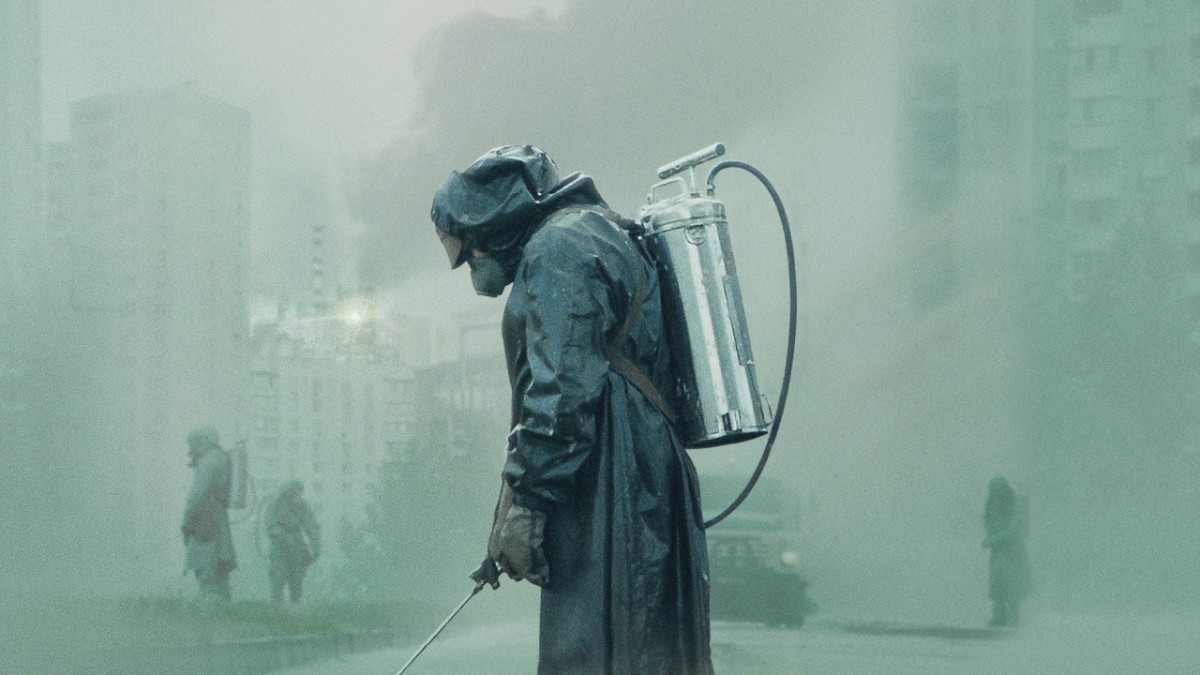There’s a line somewhere early on in HBO’s Chernobyl, in which Valery Legasov (Jared Harris) explains to Boris Shcherbina (Stellan Skarsgård) about how to put out the fire from the exploded nuclear reactor, in which Legasov states “You’re dealing with something that has never been seen before on this planet.” This line, essentially, is what encapsulates what’s so special about the HBO mini-series – the capability of human self-destruction, and the many layers of how the show can be analyzed.
But first, let’s digest the actual plot of the series: it follows a group of scientists as they try to contain the catastrophe of a soviet nuclear explosion and solve how it could have exploded in the first place, all while working against resistance from the Soviet government who’s trying to cover-up the event.
But the show’s relevance comes not from how timely it is, but how timeless it feels. In certain sequences, such as when the town of Pripyat is evacuated, it feels as if we’re watching a dystopian sci-fi film not dissimilar to Children of Men, when this actually happened only 30 years ago. And catastrophes like this are still occurring.
What this show is really about though is the manipulation and distortion of the truth. Even though this seems commonplace today, the Chernobyl incident is perhaps the perfect venue to tell such a story, given the time of the Cold War and the authoritarian government, the event sets up the story itself. But this theme is explored in such a unique way through the use of many Tarkovsky-like elements throughout the series, such as the physical movement of the elements themselves. The sight and sound of wind is used prominently in the show, serving as a plot device for not only the travel of radiation throughout the European continent, but also in how it interacts with the different elements, such as the scene on the lookout bridge shortly after the explosion where the town’s inhabitants bask in the ash and radiation.
But the elements are also effective in a more literary sense. Not only do they spread the effects of radiation throughout the show, the wind is used as a vessel to transport the lies and secrets the USSR had been hiding from the world across Europe. The Chernobyl explosion could not have been contained from the outside world, and it took such an event to expose the Soviet Union and bring about its demise.

What also feeds into this story of truth manipulation is that the series takes place around a time where we’ve discovered that humans ultimately have the power to self-destruct rather than ensure ourselves of a safer future. After the development of nuclear weapons, an arms race between the U.S. and USSR took place, with the Soviets manufacturing nuclear power at the fastest rate they can. This, by means, ultimately led to poor practices and lax security check-ups. But to go back to Legasov’s line quoted earlier, it was perhaps the first time in human history where we came closest to catastrophic man-made damage that was beyond our control. When Legasov said that they’re dealing with something the world has never seen before, he wasn’t just talking about the event itself, but also about the fact that we have created a potentially world ending event beyond our control.
But it makes me think of what the ultimate fate of humanity could be, as this event has shown, humans have developed a way to self-destruct themselves rather than develop the means to transcend what humans are capable of. Was Chernobyl the turning point where humans had ultimately decided their own fate? Will we kill each other rather than travel off planet Earth and travel beyond our solar system? What could we have been capable of?
But I don’t think about any of that when watching the show. Rather, I think of what humans are capable of in order to save themselves in a short amount of time. I think of how, if we were to face another catastrophe such as this, humans can rally together, set aside differences, and change lifestyles in order to save the world – however, only when we choose to do so. And history has shown us as such: in 1962, the U.S. declared a space race, and seven years later, a man was put on the moon, but it required unprecedented innovation. When the Icelandic volcano erupted in April of 2010, all flights between Europe and North America were cancelled. But what happened? We adapted – for a period of two weeks, there were peaceful skies, but Europe’s economy still went on. Local goods and vegetables were sold at supermarkets instead of flying them in. Businesses got used to conference calls via webcam. The President of Norway was stuck in New York. But what did he do? He relied on running the country from an iPad.
But above all else, the show is commendable not only for its multi-level relevancy, but also in how totally inoculating it is when it comes to the heavy baggage of self-loathing that accompanies working in television. It reminds us why we put ourselves through such a mission – to blow people’s minds and destroy expectations of what television can be capable of.
Featured image courtesy of HBO
